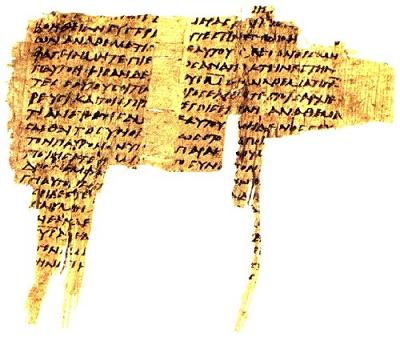| Change to Book/Chapter View |
|
|
|
Translation process is ongoing. For current status see details |
|
|

Papyrus 48 Date: Early to Middle Third Century A.D. Discovered: Oxyrhynchus, Egypt Location: Florence, Italy: Biblioteca Medicea Laurenziana Contents: Acts 23:11-17, 25-29 Notes: This manuscript shows a large amount of variance from other known manuscripts.
Acts 23 11 The following night, the Lord stood by him and said, “Cheer up, Paul, for as you have testified about me at Jerusalem, so you must testify also at Rome.” 12 When it was day, some of the Jews arranged help,
banded together, and bound themselves under a curse,
saying that they would neither eat nor drink until
they had killed Paul. 13 There were more
than forty people who had made this
conspiracy. 14 They came to the chief
priests and the elders, and said, “We have bound
ourselves under a great curse to
taste nothing until
we have killed Paul. 15 Now therefore,
we[i] encourage you
all 16 But Paul’s sister’s son heard they were lying in wait, and he came and entered into the barracks and told Paul. 17 Paul summoned one of the centurions, and said, “Bring this young man to the commanding officer, for he has something to tell him.” [..] 25 26 “Claudius Lysias to the most excellent governor Felix: Greetings. 27 “This
man was seized by the Jews, and was about to
be killed by them, when I came with the soldiers
and rescued him, having learned that he was a Roman.
28 Desiring to know the cause
why they accused him, I brought him down
to
[i] The text of the manuscript in verse 15 is much different from the Majority Text, and some of it is missing, so the translation given here is uncertain. |
How to read these pages: • The
translation to the left is based on the World English Bible. Words in regular
black font are words in the manuscript matching the Majority Text for that
passage. • Words
in italics cannot be seen in the manuscript, since the manuscript is
fragmentary. These words are supplied for readability by the World English
Bible translation. • Words
present in the manuscript but with some letters unreadable or missing are in blue
like this: blue. One Greek word often is
translated into multiple English words, and when this occurs, all the English
words are in blue. • Words
present in the manuscript but with spelling or trivial word order differences that do not affect the
meaning are in green like this: green. • If
the manuscript is different from the Majority Text, words in the Majority
Text that are missing from the text of the manuscript are marked through in red
like this: • If the manuscript is different from the Majority Text, words in the manuscript that are not in the Majority Text are underlined in red like this: new words.If the manuscript differs from the Majority Text yet matches another well-known text, this is noted in the footnotes.
|
